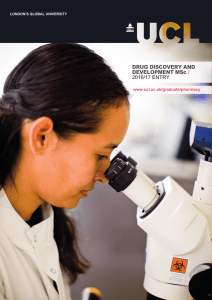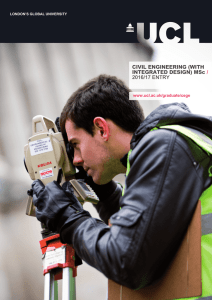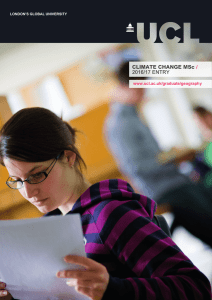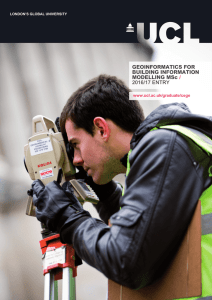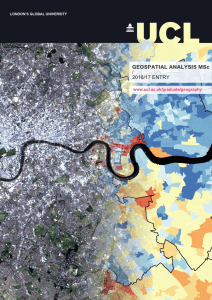ENVIRONMENTAL MAPPING MSc / 2016/17 ENTRY
advertisement
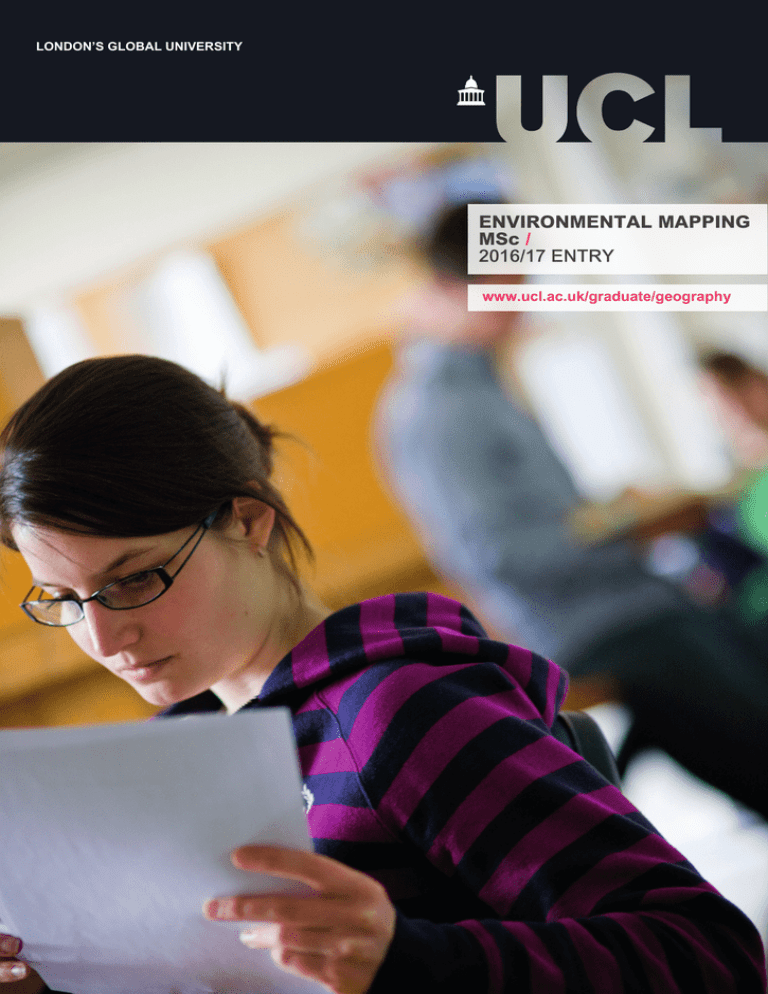
LONDON’S GLOBAL UNIVERSITY ENVIRONMENTAL MAPPING MSc / 2016/17 ENTRY www.ucl.ac.uk/graduate/geography Environmental Mapping MSc / The Environmental Mapping MSc is designed to appeal to students looking to map and understand the environment. It provides the opportunity to study at an advanced level the ways in which spatial data can be collected, processed and analysed to qualify and understand environmental issues across a wide range of applications. Degree structure Mode: Full-time: 1 year; Part-time: 2 years Students undertake modules to the value of 180 credits. The programme consists of six core modules (60 credits), optional modules (60 credits) and a research project (60 credits). A Postgraduate Certificate (60 credits), full-time 12 weeks, part-time one year is offered. CORE MODULES Degree summary Students receive core training in mapping science, analytical methods, GIS, image processing, and other fundamentals of geomatics. They develop techniques for the acquisition of data including satellite remote sensing, GNSS and LIDAR, alongside techniques for the analysis, processing, interpretation, and display of spatial data. // // // The MSc is run by UCL Geography, which enjoys an outstanding reputation for its research and teaching. This MSc offers students an all-round knowledge of methods of monitoring and understanding the environment, including the fundamental principles, current technological developments and the applications to local, regional and global problems. Graduates of the programme are equipped with highly developed practical skills to enable them to take leading roles in academic, government or industrial sectors. The programme is delivered through a combination of lectures, demonstrations, tutorials, transferable skills training, compulsory computer training and research supervision. Assessment is through unseen written examinations, coursework, and a dissertation (including a poster presentation). // Analytical and Numerical Methods // Scientific Computing // Mapping Science // Principles and Practice of Remote Sensing OPTIONS // Options may include the following: // Climate Modelling // Airborn Data Acquisition // Surface Water Modelling // Terrestrial Carbon: Monitoring and Modelling // Global Monitoring of Environment and Society // Image Understanding DISSERTATION/REPORT // All students undertake an individual research project. The department has links with industry, and projects may be carried out in collaboration with organisations outside UCL. Your career The MSc will appeal to individuals interested in developing research training while acquiring vocational skills for work in mapping and monitoring positions in public and private sector institutions. The quantitative skills the degree provides have proved attractive to employers, particularly the grounding in programming, data handling and analysis, image processing and report writing. These skills are generic and have allowed graduates to go into a range of careers in mapping and spatial analysis but also areas such as conservation and management and policy. Environmental Mapping graduates find jobs in diverse companies from consultants and NGOs carrying out environmental and spatial analysis, and governmental and government-affiliated agencies such as DECC and the National Physical Laboratory. The programme is also a suitable training for those wishing to undertake higher-level work as a prelude to a PhD Employability The range of generic, transferable skills provided by the programme has proven attractive to a range of employers. Students acquire fundamental understanding of the key principles of mapping and data handling and analysis, as well as the ability to communicate their ideas. These principles can and are applicable across a wide range of career options. The interdisciplinary, intercollegiate nature of the degree gives students a unique perspective, not just at UCL, but across the wider world of mapping and environmental science. Entry requirements A minimum of a second-class UK Bachelor's degree in a relevant discipline or an overseas equivalent (e.g. oceanography, marine studies, geography, civil engineering, geology, mathematics, physics). Relevant work experience will be considered. English language proficiency level If your education has not been conducted in the English language, you will be expected to demonstrate evidence of an adequate level of English proficiency. The level of English language proficiency for this programme is: Good. Information about the evidence required, acceptable qualifications and test providers is provided at: www.ucl.ac.uk/graduate/english-requirements Your application The deadline for all applicants is 29 July 2016. Students are advised to apply as early as possible due to competition for places. Those applying for scholarship funding (particularly overseas applicants) should take note of application deadlines. When we assess your application we would like to learn: // // // // why you want to study Environmental Mapping // where you would like to go professionally with your degree why you want to study Environmental Mapping at UCL what particularly attracts you to this programme how your academic and/or professional background meets the demands of a challenging academic environment Together with essential academic requirements, the personal statement is your opportunity to illustrate whether your reasons for applying to this programme match what the programme will deliver. Details on how to apply are available on the website at: www.ucl.ac.uk/graduate/apply PDF Updated: May 25, 2016 Information correct at time of going to press. See website (www.geog.ucl.ac.uk) for latest information FEES AND FUNDING // UK & EU (2016/17) entry: £9,020 (FT) // Overseas (2016/17) entry: £18,670 (FT) // UK & EU (2016/17) entry: £4,510 (PT) // Overseas (2016/17) entry: £9,285 (PT) Full details of funding opportunities can be found on the UCL Scholarships website: www.ucl.ac.uk/scholarships APPLICATION DATE All applicants: 29 July 2016 CONTACT Ms Fiona Mannion Email: geog-masters@ucl.ac.uk Telephone: +44 (0)20 7679 7579
